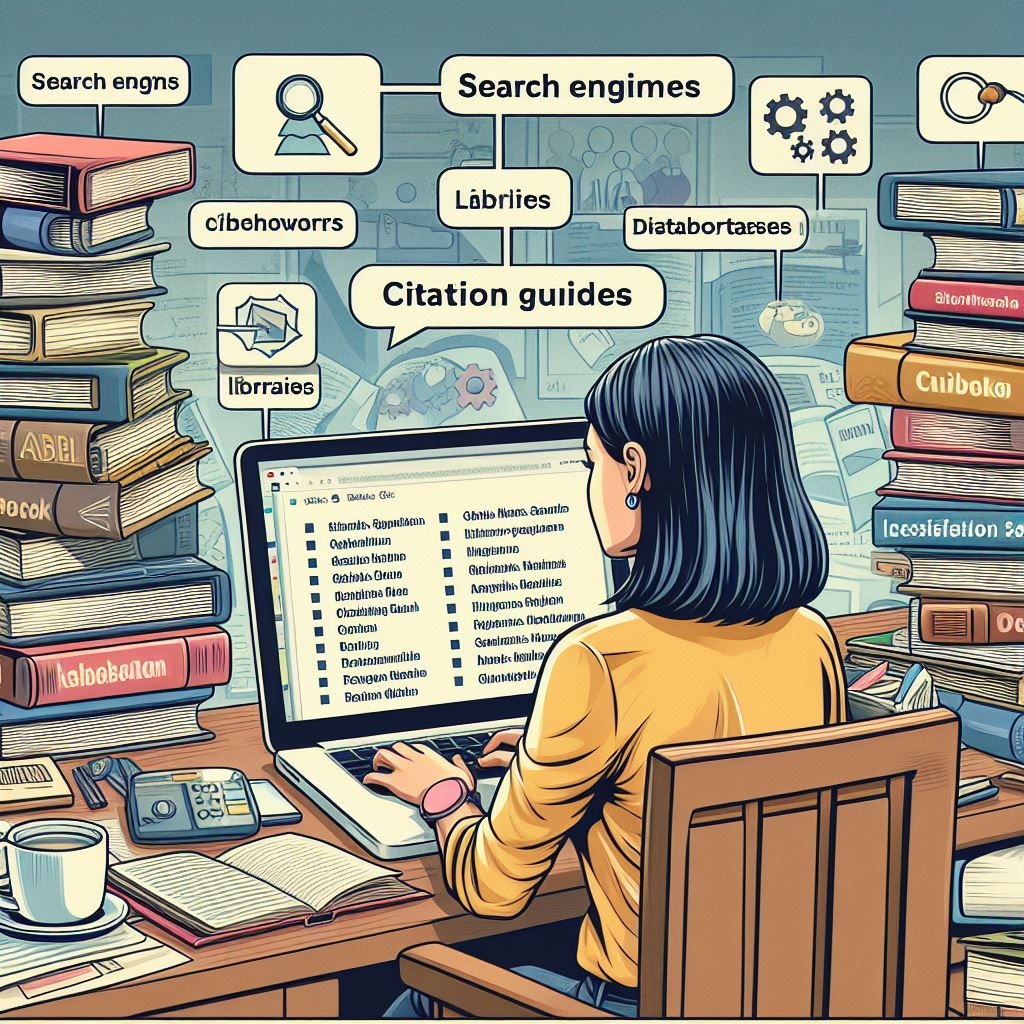How can I find good sources for my research paper?
Embarking on the journey of sourcing materials for a research paper can initially seem overwhelming. Common search engines such as Google and generalized repositories like Wikipedia serve as starting points, offering an overview or initial insights into your topic. However, these sources typically lack the depth and credibility required for academic papers. To transition from this preliminary phase to discovering reliable and substantive sources, consider employing several strategies.

Firstly, leverage advanced search techniques within search engines to refine your results. Utilize quotation marks to search for specific phrases or terms, and use the site operator to limit searches to particular domains. Additionally, explore scholarly databases and online libraries, such as JSTOR, Google Scholar, or your institution’s library catalog. These platforms host peer-reviewed articles, academic journals, and books that often offer comprehensive, well-researched content suitable for academic papers.
Furthermore, scrutinize the bibliographies or reference sections of the sources you’ve already found. These sections can unveil a goldmine of related materials, directing you to other credible publications on your topic. Peer-reviewed articles and scholarly books referenced in reputable sources can serve as reliable building blocks for your research paper, lending credibility and depth to your work.
Refining Research Keywords and Tags for Effective Searches
Core Research Terms
- Keywords: Fundamental terms related to your topic.
- Synonyms: Alternate words or phrases expressing the same idea.
- Subject Headings: Official terms used to categorize topics in databases.
- Descriptors: Specific terms describing various aspects of the subject.
- Boolean Operators: “AND,” “OR,” “NOT” to refine or broaden searches.
Additional Keywords
- Acronyms and Abbreviations: Expanded versions of shortened terms.
- Related Concepts: Terms that are tangentially linked to your topic.
- Specific Dates or Timeframes: Chronological information relevant to your research.
- Authors’ Names: Particularly if you’re looking for a specific scholar’s work.
- Geographic Locations: Place names related to your subject matter.
- Methodologies or Theories: Research approaches or frameworks used in your field.
Tags and Linked Terms
- Subject Tags: Terms used by databases to categorize sources.
- Related Links: Explore related sources via tags or linked terms.
- Citation Keywords: Terms highlighted in citations or bibliographies.
When conducting research, start with a core list of keywords related to your topic. As you explore, note down synonyms, descriptors, and subject headings you come across. These terms can expand your search criteria and improve the breadth of your results.
When you discover a valuable source, look for any associated tags or keywords. These terms can serve as entry points for finding similar sources or related concepts. Additionally, tags might lead you to linked terms, guiding you toward a network of interconnected resources. Follow these leads to discover a broader range of pertinent materials and refine your search strategies for comprehensive research.
Strategizing Source Acquisition: Aligning Relevance and Quality
Gathering reputable sources for a research project involves a strategic approach, aligning the material’s relevance with the standards of quality required for academic or investigative endeavors.
Assessing Source Relevance and Quality
When delving into the realm of sourcing materials for your academic endeavors, it’s pivotal to discern their relevance and quality concerning both the assignment’s stipulations and the particular focus of your inquiry. Leverage the tools available in various library search engines and databases, leveraging their filtering options to sift through information and pinpoint specific categories like “peer-reviewed” or “scholarly” sources. These filtering mechanisms serve as invaluable aids, enabling you to streamline your search and acquire materials that have undergone expert scrutiny and validation before publication.
Furthermore, the UofL library’s Research Guides provide a comprehensive roadmap, guiding you toward databases specifically tailored to your research domain, ensuring the procurement of pertinent and substantiated information aligned with your study’s requirements.
Defining Source Quality
Determining the quality of sources begins by aligning them with the focus and depth of your argument or inquiry. For more general or foundational topics, references such as dictionaries or Wikipedia can offer foundational information. However, when your argument demands in-depth research or academic discourse, it becomes essential to seek out peer-reviewed articles or scholarly materials. This distinction allows you to select sources that match the rigor and depth necessary to support your argument effectively.
Understanding the essence of your inquiry empowers you to identify sources that not only complement but also enhance the credibility and depth of your work. By discerning the specific needs of your argument or question, you can navigate through various source options, ensuring the integration of materials that substantiate and enrich your ideas.
Expanding Source Pool with Citations
When embarking on research, diving into the works cited or bibliography section of the sources you’ve found beneficial can greatly enrich your resource collection. These sections often contain a wealth of additional materials that align with your research topic, expanding your scope and providing a roadmap to explore related literature. By tracing the citations referenced in these sources, you can uncover a network of interconnected materials that contribute to your research endeavors. Additionally, platforms like Google Scholar offer tools like the “Cited by” feature, which allows you to navigate citation trails, opening doors to further relevant resources. Utilizing these functions efficiently broadens your understanding and aids in finding complementary materials for your project.
Exploring Existing Citations
Exploring existing citations within sources that have proven beneficial can be an effective strategy for broadening your resource base. By scrutinizing the works cited or bibliography sections of these materials, you’re likely to unearth a wealth of supplementary sources that resonate with and contribute to your topic. These citations serve as a roadmap, guiding you toward related scholarly works and providing a nuanced understanding of your subject matter through the lens of reputable references.
Additionally, search engines like Google Scholar often offer a feature labeled “Cited by,” allowing you to access a list of other sources that have cited the material you’re exploring. While the quality of results on platforms like Google Scholar may vary depending on the subject area, this tool can serve as a valuable starting point, leading you to peer-reviewed works and building upon the credibility of your research findings.
Leveraging Citation Trails
Certain search engines and databases provide users with features like “Cited by” links or citation trails, exemplified by the functionality offered through platforms like Google Scholar. These tools offer a breadcrumb trail of sources that have referenced the particular material you’re currently examining. While the quality and relevance of results might fluctuate across subject areas and disciplines, leveraging these features can serve as an efficient method to unearth supplementary materials pertinent to your research interests. By navigating citation trails, you delve into an interconnected network of scholarly references, potentially unveiling valuable insights and additional supporting materials that enrich the depth and credibility of your project.
Utilizing these citation trails not only expands your resource pool but also presents an opportunity to discover diverse perspectives and contributions to the discourse surrounding your topic. This exploration through interlinked citations can lead to a deeper understanding of the subject matter, facilitating a more comprehensive and nuanced approach to your research.
Utilizing Google Scholar
Google Scholar’s “Cited by” feature empowers researchers to explore materials that have referenced a specific work, offering an avenue to expand perspectives and deepen understanding within their field of study. Although the reliability of results on Google Scholar can fluctuate, this function remains an invaluable tool for investigating citation trails and uncovering additional resources relevant to your research area. Leveraging this feature enables scholars to navigate through interconnected scholarly references, potentially enriching their knowledge base and strengthening the breadth of information within their project.
The “Cited by” function in Google Scholar not only widens the scope of available resources but also aids in discovering diverse viewpoints and contributions related to your area of interest. By traversing these citation trails, researchers gain access to varied perspectives, facilitating a more comprehensive exploration of the subject matter and fostering a deeper engagement with the scholarly discourse surrounding their topic.
Collaborative Research Assistance:
The Ekstrom Library’s reference librarians, situated adjacent to the University Writing Center, serve as invaluable resources for your research needs. By scheduling appointments with these experts, you gain access to comprehensive support in navigating the complexities of academic inquiry and source identification.
Through these consultations, librarians provide tailored guidance on database selection, aiding in the exploration of specialized resources aligned with your research objectives. Furthermore, they offer expertise in source evaluation, assisting in the identification of credible and pertinent materials crucial for academic projects. Utilize these collaborative sessions to enhance your research efficiency and source analysis skills.
Accessing Reference Librarians:
The Ekstrom Library’s reference librarians, strategically situated right next to the University Writing Center, offer a wealth of invaluable assistance when it comes to steering through your research inquiries. By scheduling appointments with these experts, you gain access to their extensive knowledge and experience spanning a multitude of research methodologies and information retrieval techniques. Their guidance and insights play a pivotal role in enhancing your research strategies, aiding in the exploration and utilization of numerous resources within the library’s extensive collection.
Database Guidance and Selection:
During these scheduled appointments, the adept librarians proactively assist in accessing and navigating databases that best align with your unique research objectives. Their invaluable guidance extends to illuminating the array of databases available within the library’s extensive collection, tailoring recommendations to match your specific topic, academic discipline, or research area. By leveraging their expertise, you gain insights into database functionalities and selection criteria, ensuring a more refined and efficient exploration of pertinent research materials.
Source Identification and Evaluation:
During these sessions, you can engage in detailed discussions regarding source selection. The reference librarians offer invaluable guidance in identifying sources that align closely with your research objectives. They help sift through numerous resources, emphasizing relevance, reliability, and credibility in source identification. Furthermore, these sessions serve as a platform to acquire essential techniques for evaluating source quality. The librarians impart invaluable insights into distinguishing between reputable, scholarly materials and less reliable sources, equipping you with the tools needed for effective information assessment in your academic endeavors.
What can the Writing Center do to help?
Navigating the intricacies of a research project can often be overwhelming, but at the Writing Center, we’re here to alleviate that stress. Our dedicated consultants are equipped to assist you at every stage of your research, providing tailored guidance, brainstorming strategies, and valuable direction to streamline your search for credible and relevant sources. Whether you’re just embarking on your research journey or seeking to enhance the depth of your resources, our team is here to offer comprehensive support.
Initiating Research Guidance
At the Writing Center, our consultants specialize in providing comprehensive assistance right from the start of your research journey. Through interactive sessions, they foster brainstorming activities to generate exhaustive lists of research terms and tailored strategies specific to your research topic. This collaborative approach enables consultants to help you establish a clear direction, refine research objectives, and initiate a productive research trajectory.
Strategic Source Selection
Consultants delve into the nuances of source selection, guiding you in identifying the most fitting sources that align with your research queries. Utilizing in-depth discussions and preliminary investigations, they assist in discerning various source types—ranging from scholarly articles to primary documents—that effectively cater to your research questions. Moreover, they facilitate the evaluation process, ensuring the credibility and relevance of potential sources to lay a robust foundation for your research endeavors.
Referral and Follow-up Assistance
Understanding the value of specialized guidance, our consultants proficiently direct you toward follow-up appointments with the Reference Assistance and Instruction department whenever necessary. They adeptly recognize scenarios where additional support from specialized reference librarians could be advantageous for in-depth or specialized research guidance, ensuring you have access to comprehensive assistance at every stage of your research journey.


